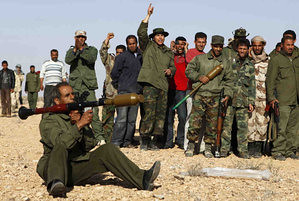
Libyan civilians training to defend the country and government against NATO and CIA-backed counter-revolutionary rebels now engaging in attacks in several cities. The U.S. and its imperialist allies are seeking regime-change in the North African state., a photo by Pan-African News Wire File Photos on Flickr.
June 22, 2011
House Opens New Challenge to Obama Over Libya Mission
By CHARLIE SAVAGE
New York Times
WASHINGTON — Republican leaders in the House of Representatives are moving to address head on the escalating tensions over President Obama’s authority to continue the military mission in Libya, unveiling two proposals about the conflict late Tuesday that the chamber may vote on as soon as Thursday.
One of the proposals is a resolution that would approve continued American military participation in the NATO-led air strikes, while barring the introduction of ground forces. It echoes a proposal this week by two senators: John McCain, Republican of Arizona, and John Kerry, Democrat of Massachusetts. The alternative proposal is a resolution that would direct Mr. Obama to stop missile strikes by American drones and piloted aircraft, but allow the United States military to continue supporting the NATO campaign in other ways — like search-and-rescue, aerial refueling, operational planning, and intelligence, surveillance and reconnaissance.
The second resolution, by implicitly authorizing the United States to continue participating in the NATO mission in ways that do not involve direct strikes, appears to be aimed at the Obama administration’s controversial argument that the military’s activities in Libya do not constitute “hostilities” and so are not bound by the War Powers Resolution.
Under that law, presidents must terminate deployments into hostilities 60 days after notifying Congress that they have begun, unless lawmakers authorize the mission to continue. That deadline appeared to pass on May 20 for the Libya mission. Last week, the White House raised its “hostilities” argument, a legal theory Mr. Boehner and many others rejected.
In a statement announcing that the House Republican Conference would meet Wednesday to discuss the two new resolutions, Mr. Boehner said that while “we have no desire to damage the NATO alliance,” Congress must also hold the White House “accountable” and ensure that it does “not ignore its obligations to the American people and the laws of this country.”
There have been about 90 missile strikes from American piloted aircraft and drones since early April, when the United States turned control of the campaign over to NATO. The administration’s theory that it is not engaged in “hostilities” turns in part on the idea that the Libyans cannot meaningfully exchange fire with American forces, so there is little risk of American casualties.
The New York Times reported on Saturday that the theory — while backed by top lawyers at the White House and the State Department — was not supported by top lawyers at the Pentagon and the Justice Department. In particular, the Pentagon’s general counsel, Jeh C. Johnson, had proposed ending missile strikes after May 20 in order to bolster the case that the rest of what the military was doing did not cross the threshold into “hostilities.”
“It is clear that the Obama administration’s claim that targeted bombings, missile strikes, and other military actions in Libya do not constitute ‘hostilities’ under the War Powers Resolution is not credible,” Mr. Boehner said. “As we have learned in the past week, even his administration’s attorneys from the Office of Legal Counsel and the Department of Defense recognize that.”
The resolution that would direct Mr. Obama to scale back the military is a “concurrent resolution,” a category of legislation that is not presented to the president to be signed or vetoed. It is drafted so that it would be considered “privileged,” meaning it could be quickly brought to the floor and could not be filibustered were it to reach the Senate.
The War Powers Resolution, which Congress enacted in 1973 over the veto of President Richard Nixon, says that Congress can use such a device to direct the president to re-deploy troops. But such a resolution is likely not legally binding. A 1983 Supreme Court suggested that under the Constitution, Congress may only direct the executive branch to take actions through legislation that the president has an opportunity to veto.
Nevertheless, it could have significant political influence. Were Congress, or at least the House, to pass the resolution, Mr. Obama could choose to act in accordance with it by stopping missile strikes from American aircraft without conceding that doing so was legally necessary, a potential way for both sides to stand down while making a plausible argument that they were satisfied with the outcome.
Peter M. Shane, an Ohio State University law professor and co-author of a casebook on the separation of powers, said that while such a concurrent resolution would not be legally binding, it would tell Mr. Obama “that although his formal legal position may be dubious,” he can “steer toward calmer political waters if he conforms his behavior to what Congress has sanctioned.”
Still, Mr. Shane also said that Congress may want to craft the final text of any such resolution carefully to avoid declaring that the categories of action it is approving in Libya do not count as “hostilities” for purposes of the War Powers Resolution, lest it inadvertently set a precedent allowing presidents greater leeway to participate in multi-lateral armed conflicts without its permission.
“If Congress goes on the record — even without it having the force of law — as conceding that these categories amount to non-hostilities, then the capacity of the president, on his own initiative, to participate in international military offenses is enormously expanded,” Mr. Shane said. “I can’t imagine that’s what Congress wants.”
No comments:
Post a Comment